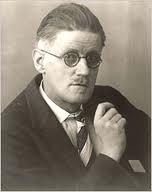
Joyce first conceived of the fiction that became Ulysses as another story for Dubliners. That's the way "The Dead" began, too. Of course "The Dead" did become the final story in Dubliners, and it may seem that it is unlike all the others in a way that any pared down version of Ulysses also would have to have been. If it weren't for "The Dead," the greatness of Ulysses would have come as something like a bolt out of the blue. I've read A Portrait of the Artist as a Young Man, the work published between Dubliners and Ulysses, a couple of times, and can't warm to it. Maybe I'm missing something. The technical innovation of Ulysses, and the challenge it lays upon the reader, has obscured somewhat the way in which that novel transcends ordinary boundaries and achieves the status of a kind of secular scripture, a reservoir of everything that can be usefully represented about what is sometimes called "the human condition."
"The Dead" is the only thing Joyce wrote that suggests he might be capable of such an achievement. The main character, Gabriel Conroy, is consistent with Joyce's other Dubliners in the respect that he might seem a fit object for the author's contempt. What someone has said about J. Alfred Prufrock, that he sounds too plump and well-dressed to sing a love song, applies to Gabriel, too--not his name but his actual self. When he first arrives at the party, he stamps the snow off his galoshes, and his wife soon jokes about how he thinks it very important that she wear galoshes, too. Very late that evening, as he leaves the party, he sees his wife transfixed by piano music drifting into the foyer by the exit. Her mood sends him into a swoon of sexual desire, but she later reveals to him, when they are alone in their hotel room, that she had been thinking of a delicate boy who died a few days after singing to her that same song in the cold air on the night before she moved away from him. Gabriel, the wearer of galoshes, then "saw himself as a ludicrous figure, acting as a pennyboy for his aunts, a nervous, well-meaning sentimentalist, orating to vulgarians and idealising his own clownish lusts, the pitiable, fatuous fellow he had caught a glimpse of in the mirror."
The whole long first portion of the story functions largely to confirm the justness of Gabriel's epiphany--it's a law that you must deploy "epiphany" when discussing Joyce--concerning himself. But note a couple of things. First, the effect of Gabriel coming to this conclusion is quite a different thing from the narrator making the same judgment. And second, the adjectives, which include "well-meaning" and "pitiable." In many of the other stories in Dubliners, we are aware of the narrator's artful sneer, but the volume ends with a scene suffused with sympathy. Gabriel's interior monolog as he gazes on his sleeping wife, the object of the passionate dead boy's love, includes this:
Poor Aunt Julia! She, too, would soon be a shade. . . . He had caught that haggard look upon her face for a moment when she was singing Arrayed for the Bridal. Soon, perhaps, he would be sitting in that same drawing-room, dressed in black, his silk hat on his knees. The blinds would be drawn down and Aunt Kate would be sitting beside him, crying and blowing her nose and telling him how Julia had died. He would cast about in his mind for some words that might console her, and would find only lame and useless ones. Yes, yes: that would happen very soon.
This is followed by the glimmering last paragraph, in which it is reported that "the snow was general over all of Ireland," and we are meant to infer, I think, that the problems of Gabriel and the other citizens of Dublin are universal and not really admitting of solutions.
